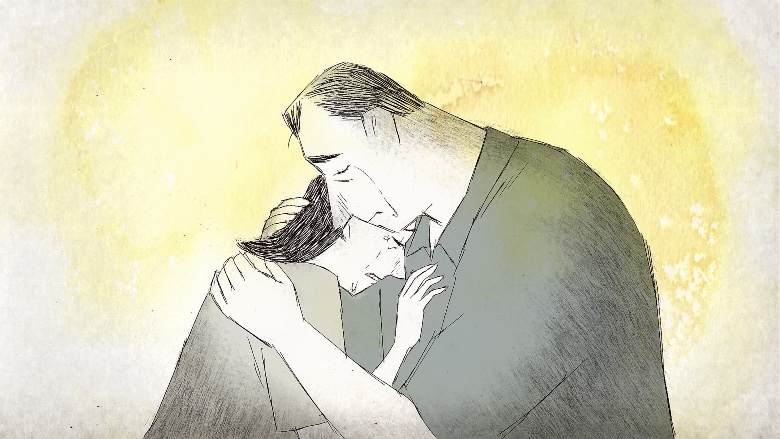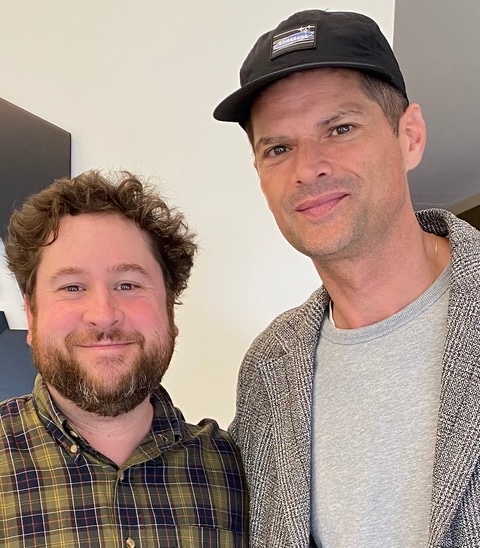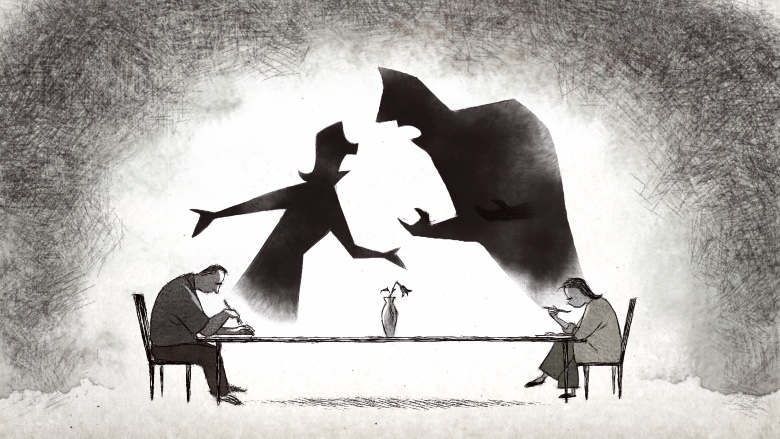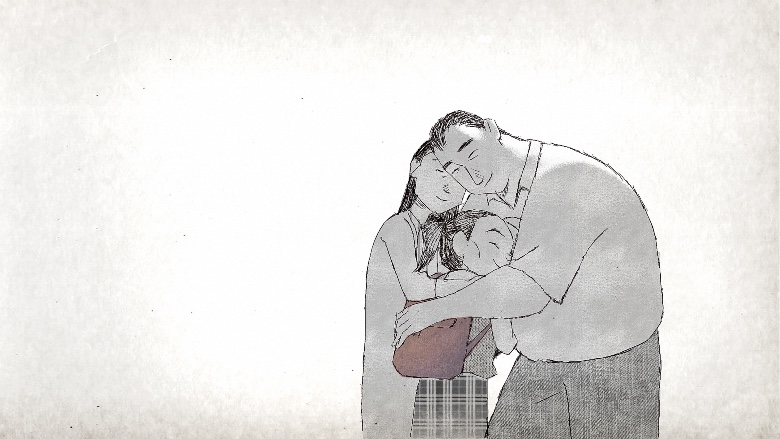
For our next to last Animated Short Spotlight, we’re back at Netflix for If Anything Happens I Love You, an incredibly powerful and moving film by Will McCormack and Michael Govier, possibly the unlikeliest pair of collaborators you’re likely to meet when it comes to the world of animation. Granted, McCormack had worked with his writing partner Rashida Jones on a fairly recent Pixar film after that same duo wrote the Sundance favorite Jesse and Celeste Forever. Govier is a TV actor and writer who has written and starred in a couple shorts but neither of them animated.
If Anything Happens I Love You is another wordless animated short that looks at two parents trying to get over the loss of a child, a story that unfolds slowly over the course of the film until its devastating reveal at the end. While I’ve personally been a fan of all the shorts we’ve featured in this series so far, this is the one that just feels like it has the opportunity to go all the way to Oscar night, and maybe even win? (It has won a bunch of awards at the festivals at which it was able to play in 2020 before going onto Netflix.)
Below the Line spoke with the two collaborators over Zoom a couple weeks back.
Below the Line: Neither of you are the typical people involved in animation so what got you going on this, how did you guys start preparing to do this?
Will McCormack: We actually met in an acting class in the Valley, which is so L.A., right? We’re both writers, and we met as writers do to talk about what we were working on. I think we were both interested in writing about grief and trying to wrestle narratively with some of the loss in our own lives. Michael had this beautiful sort of Jungian idea of these shadows that sort of represent the pain and the agony that people who are grieving can’t reach, because they’re just so distraught. I thought, “God, that’s such a beautiful representation of grief, of that disparity.” Then we just kept reading over and over and over again about gun violence and mass shootings, and we thought, “What would it be like to try to tackle that?” That’s how it really began.
BTL: About how long ago was that between meeting and saying, “Hey, let’s do something.”
Michael Govier: We met in early 2017 and became friends, and then we started the project late 2017 and 2018, and then we wrote the script for about a year, because we didn’t have the luxury or time to explore things or animate things. We really had to get the script as tight as we could to kind of maximize all of our money that you see on screen.
McCormack: Funny story. When we met, Michael was doing a scene from Celeste and Jesse Forever in class.
Govier: First day, we walk in, and I’ve never met Will. I don’t know him at all. Both of us were like the new kids in class, first day of school – I end up sitting down next to him, and then I go up and all the scenes are from different films and stuff. I go up and do a scene from Jesse and Celeste Forever, and I sit back down. I don’t know who Will is, I don’t know, he wrote this, so I sit back down, and he leans over to me and he goes, “I really like your scene, you did a really good job.” I’m like, “Oh, thanks, man,” just as people say, right? Then we’re walking out, and he leans over to me and goes, “I should probably tell you this: in full disclosure, I wrote that.” I’m like, “What?” “Me and Rashida wrote that.” And then everything started to click, and he goes, “You did a great job,” and I said “Thank you for not telling me before,” because I don’t think I could handle that your first day in class and the writer is sitting next to you. It’s a lot.
BTL: Is Jesse and Celeste the new Shakespeare?
Govier: It’s that good! I probably watch it once a year. I mean, the storytelling is so tight. Will is a master storyteller, as is Rashida. Both of them are so strong with that story and that narrative, it’s just impressive.
McCormack: They do that breakup scene in acting classes a lot, which is flattering.

BTL: How did you go about finding the animators and finding the people to bring your story to life?
Govier: We had two huge people that helped us early on. One was Maryann Garger, who’s a huge producer. She’s produced the LEGO Ninjago movie. She’s been working for 30 years in animation at DreamWorks for probably 20 to 30 years. Now she’s independent, so she’s a huge producer. Once we found her and she was able to help us secure editors and secure a lot of other people. The other major person that helped us was Maija Burnett, who is a professor at Cal Arts, and we reached out to her, because we wanted to provide opportunity for up and coming artists who might not have this opportunity. Just like us, we’re getting a wonderful opportunity that we might not get, and we want to provide opportunity for a lot of other people to have their first shot at something amazing. We contacted her, and said, “Hey, what wonderful artists do you have that are just graduating?” We sent her the script, and she said, “I got the name for you — Youngran Nho.” We met with her, and then it was just kind of over. It was like she was the perfect fit, and she became the animation director, and it was just an amazing meeting.
BTL: Did she draw anything? What kind of pitch did she have, coming from out of Cal Arts?
Govier: She had like a reel and she had her master thesis short, so she had little pieces like that, but she did not have, at that moment, the bulk of work or the huge amount of work, which she will have now. But she had incredible talent and incredible raw design that we loved, and her style and also her emotional storytelling is what we really hired her for. She could tell a story so emotionally, is what we knew we needed, and we didn’t want anything to be too cutesy, because of the subject matter. We needed to kind of have this very raw emotion, and she was able to deliver that.
BTL: It’s amazing work with a look somewhere between a New Yorker cartoon and maybe a little Bill Plympton without being so exaggerated. How did Laura Dern get involved, because that’s a name that can help get a movie out there.
McCormack: I’ve known Laura Dern for years, and her producing partner Jamie Lemmons had worked before, and I’m just a huge fan of Laura and Jamie’s, and the work that they do. Everytown for Gun Safety became friends of the film early on and sort of gave us the blessing on the project. We went to them early on to make sure that this story was a true, authentic representation of grief. It’s a heavy subject, and it’s a very serious subject, so we took it seriously. We wanted to make sure we had Everytown for Gun Safety’s blessing. Laura and Jamie do a lot of work with Everytown for Gun Safety, so I knew it was an area of story that they were interested in. We just showed them the movie, and they leapt at it right away, which was one of the best things that can happen to you when you’re making a tiny independent film when Laura Dern and Jamie Lemons come on board. It just immediately gives the movie some power that it doesn’t have, which little movies need. We’re really fortunate to have Laura and Gary Gilbert and Netflix. You need all the help you can get when you’re making a tiny, tiny, tiny film.
Govier: We were just like this little independent thing. The film was built with like a handful of us around the kitchen table. My kitchen table, Will’s kitchen table or Maryann’s kitchen table. It was just three animators and us, and we just kind of ground it out. We were just so blessed that once we created something, Laura Dern and Gary Gilbert and Jamie Lemmons really jumped on board because of the message and the power of the story. I think it was a huge lesson for us. We thought we’re doing something exceptional, and they just wanted to be part of it, and we were so honored that they wanted to join.

BTL: I assume a lot of this was done before COVID, because obviously, you can’t sit around a kitchen table now.
Govier: Telling these stories, it’s almost like, “Are you making this up? You guys are together?” No, no, I mean, we actually haven’t seen each other live since March. We had an early screening at the top of March, like about a week before the first lockdown started, and that was the last time we’ve ever seen each other live as far as our whole team. We’ve done this kind of thing, but we have not seen each other live. The film was completed roughly January, February of 2020. And then all the festivals.
BTL: Was it supposed to go to festivals, or did it go to festivals?
Govier: It did. It played in over 40 festivals, and it won the Edmonton, which was an Oscar-qualifying one, and then it won 12 festivals, as far as its full festival runs. It had a very healthy festival run of the ones that weren’t canceled. We got into another 20 of them, but then they actually canceled or pivoted or did other things which was unfortunate.
BTL: How was it communicating with the animators and the tech people, which must have been a fairly new world to you both?
Govier: Will and I have come up through the theater, so we came up in a huge world of collaboration, as far as working with people. You’re constantly working with everyone. It was a wonderfully organic collaborative process, and we delivered everything through Slack, so we’re online all day on Slack, just talking and putting up images and saying, “Here’s a reference image. Here’s a reference video,” and we’re just slowly building it as a team that way.
McCormack: It’s interesting. We spent a year on this script, which is only ten pages long, because we knew we wanted to get it right. We knew that we would have very little money, so what we’re gonna animate, we’re probably gonna have to use. We don’t have the resources to just keep re-animating stuff. We had a very, very specific idea of what we wanted, and what we knew we were trying to get. Also, our all-female animation team is so gifted, that immediately — and I think you get lucky sometimes making a movie — we had an instant rapport with them, which just felt so organic. Also, to echo Michael I think that communicating with artists is not dissimilar to communicating with actors or directors. It all feels like it’s part of the same cookie jar, right? Like you’re just trying to get to the middle of something, you’re trying to get to the heart of something. It all feels like it’s all headed in the same direction, whether it’s drawing or acting, you’re just trying to get to the middle – you’re trying to get to the heart of something – so that felt familiar.
BTL: Do either of you draw so you could do rough storyboards or anything?
McCormack: The rough we drew is like basic redrawing, re-editing over someone else’s drawing and saying, “Hey, shape this in, bend this out,” but we do not have formal like boarding experience or formal boarding training like that.
BTL: I want to ask about the use of the song “Beautiful Dreamer,” because when it came in, I immediately thought it was the Disney theme, maybe due to the instrumentation or notes they share. Was that deliberate or coincidental?
Govier: We were chasing a very magical moment, which I think if that’s what you’re feeling. It was a very magical moment, it’s very romantic. It’s kind of like a wonderful memory, and we just loved the song “Beautiful Dreamer,” because it brings up your childhood. It’s a song that felt like it’s always been there, and it’s such a romantic, sweet song. We weren’t exactly like trying to chase any other studio or Disney or anything like that. We were just trying to make this sweet, little romantic moment. We also got the Inner City Youth Orchestra of Los Angeles recorded that section for us and scored it. So that was so nice.

BTL: Any idea what you might want to do next? Obviously, this has a bit of a journey to go. Are you going to try to do another movie together this way?
McCormack: Yeah, we just finished our script. We’re gonna go right back into another animated short film, and we’re working on a feature and a TV show, too. We have a whole bunch in the works, but in the very, very near future, like next week, we’re gonna start working on a short film.
Govier: Yeah, we’re gonna start the next film. We’ve finished the script, and we’re probably gonna start boards and exploratory art, probably next Monday.
BTL: Are you going to try to use the same animators?
Govier: Yeah, we’re gonna keep the same animators, work with that same team. We just love Youngran and Michelle [Heo] and the whole crew.
BTL: I think I’m out of questions, so is there anything else you’d like to say about your movie for the people reading this?
Govier: One thing that we have noticed is that this film is such a wonderful gateway to begin discussions about grief. So many people have continued to contact us and say, “Thank you for making this film, because I’m starting to talk about grief a little more.” We’ve had people who had all kinds of loss outside of gun violence, but everyone is grieving in their own way and different things. They brought up this film, because grief is kind of quiet at times, where it’s just like those little things. Maybe it’s that piece of paper that’s got handwriting on it from the person who’s passed or an item that they left behind. It just always reminds you of that, and I think this movie has a lot of those components in it, where you find a piece of clothing or that favorite piece of music, and it just brings back all those wonderful memories of the ones you’ve lost.
McCormack: One other cool thing I don’t know if you know or not, but the movie totally exploded on Tik Tok. People were just filming their reactions to the movie showing themselves before the movie and then after the movie, but it was just a really cool moment. The movie has 60 million views on Tik Tok, over 60 million now, but it was really astonishing but also humbling, and also surreal to watch people watch your movie. It was so cool that people were sort of willing to be emotional and be vulnerable and express feelings in grief on Tik Tok, which is usually for like water bottle challenges. It felt anomalistic in a way, but it was really, really, really cool. Michael and I, we’re from an era where we didn’t have active shooter drills at school. I think a lot of the kids in the world are just walking around with this looming fear, and I think also with the pandemic gave people an opportunity to just grieve and express relief.
BTL: Were those reactions all from when it hit Netflix?
Govier: It’s all from Netflix, so it just started, a couple people posted themselves saying “There’s supposed to be this very sad film on Netflix. Here’s me before, and I’ll film me after.” And then they film them after having these huge emotional experiences, and they’re crying. Some are talking about their experiences as far as about being in school, and also just the experiences of loss. It’s this huge cathartic moment that is happening on Tik Tok. It’s really impressive to see these epic responses, because you’d never have this level of intimacy at a theater. You’re not this close. You’re this close, and you’re seeing someone just cry and have all these huge feelings like in their bedroom or in their living room. It’s really impressive.
McCormack: To watch people watch your movie in real time. I don’t know that that’s ever happened for filmmakers. It was totally surreal.
BTL: I guess you can see that at festivals, but you can’t just go up to them in the dark to get a close look at their reactions.
Govier: We’ve been at festivals where we see people crying and dabbing their eyes in a giant room, but they’re filming themselves just like I’m looking at you right now crying. It’s so intimate, and I’ve never seen that experience.
If Anything Happens I Love You is now available to watch on Netflix.
All pictures courtesy of Netflix.





